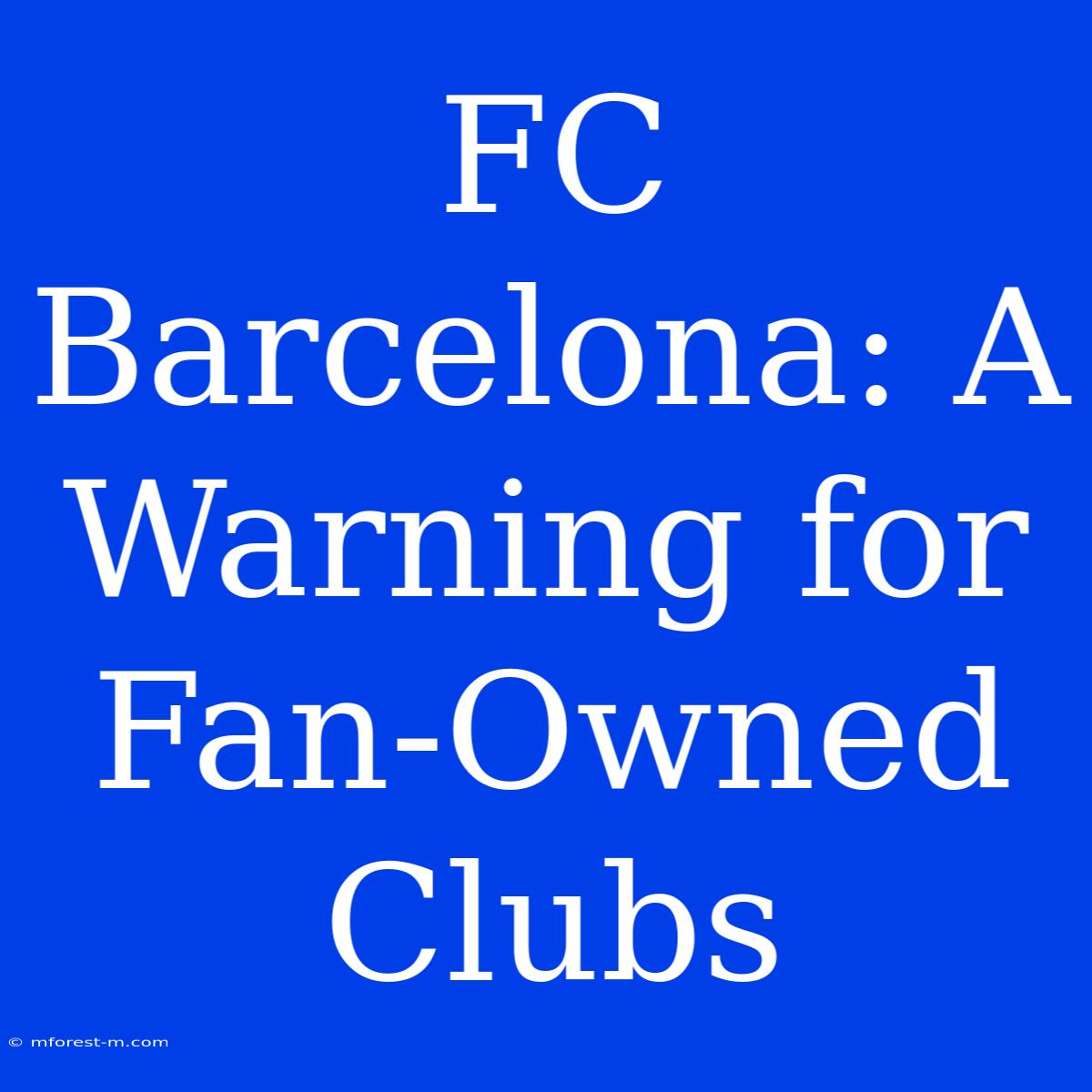FC Barcelona: A Warning for Fan-Owned Clubs?
Is the financial crisis at FC Barcelona a harbinger of trouble for fan-owned clubs everywhere? The recent struggles of this iconic club, once a symbol of success and financial stability, have raised serious questions about the viability of fan ownership models.
Editor Note: FC Barcelona, a club synonymous with the "Mes Que Un Club" motto, has been rocked by a financial crisis, leaving many fans worried about the future of the club.
This situation is important to discuss because it goes beyond a single club's struggles. It highlights the complex challenges that fan-owned clubs face in a modern, increasingly commercialized football landscape.
This analysis delves into the root causes of Barcelona's financial woes, examining its spending habits, revenue streams, and the impact of the pandemic. We will analyze how these factors have influenced the club's situation and what lessons can be drawn for other fan-owned clubs around the world. We also explore the unique challenges associated with fan ownership models and their potential impact on the club's financial stability.
Key Takeaways from the Analysis:
| Factor | Impact |
|---|---|
| Overspending | Uncontrolled spending on player transfers and high salaries has led to an unsustainable wage bill and financial imbalance. |
| Revenue Dependence | Reliance on commercial revenue streams, particularly from sponsorship deals, makes the club vulnerable to economic downturns. |
| Lack of Diversification | Limited investment in alternative revenue sources, like merchandising and youth development, reduces resilience to financial shocks. |
FC Barcelona's Financial Woes
The Catalan giants' financial woes stem from a combination of factors, including:
Overspending on Players
Barcelona's history is littered with marquee signings, from Ronaldinho to Neymar. While these players brought success, their high salaries and transfer fees contributed significantly to the club's current debt burden. The club's wage bill has become unsustainable, exceeding revenue streams, putting pressure on the overall financial structure.
Revenue Dependence on Sponsorships
Barcelona's income is heavily reliant on commercial partnerships, primarily sponsorship deals. While lucrative, this dependence creates vulnerability. When economic downturns hit, sponsorship revenue can decline, impacting the club's financial stability.
Lack of Diversification in Revenue Streams
Beyond player transfers and sponsorship deals, Barcelona has not invested significantly in other revenue streams. Merchandising, youth development, and stadium-related activities have lagged behind, limiting their potential to offset financial risks.
Fan-Owned Clubs: Navigating a Commercial Landscape
Fan-owned clubs face unique challenges in the modern football landscape. While ownership structures allow for greater fan engagement and a sense of belonging, they also present specific financial hurdles.
Financial Transparency and Governance
Fan-owned clubs, by their very nature, operate under public scrutiny. Financial transparency is crucial to maintain trust and accountability, requiring rigorous financial management and disclosure practices.
Balancing Fan Expectations and Financial Sustainability
Balancing fan expectations for success with the need for financial stability is a delicate act. Fan pressure for big signings and consistent victories can strain the club's resources, forcing difficult decisions about spending and investment.
Limited Access to Capital
Fan-owned clubs may face limitations in accessing large amounts of capital. Traditional avenues, such as bank loans or private investments, might be less accessible compared to clubs with more substantial financial backing.
What does this mean for the future of fan-owned clubs?
FC Barcelona's financial woes serve as a cautionary tale for fan-owned clubs around the world. It highlights the importance of sound financial planning, diversification of revenue streams, and a commitment to long-term stability.
Fan-owned clubs need to adapt to the commercial realities of modern football without sacrificing their values. This includes adopting modern financial practices, embracing data-driven decision-making, and exploring alternative revenue streams to secure a sustainable future.
FAQ
Q: Is FC Barcelona in danger of going bankrupt?
A: While the club is facing a serious financial crisis, bankruptcy is unlikely. Barcelona has a strong brand, loyal fan base, and valuable assets that make it attractive to potential investors. However, it faces significant challenges that need to be addressed.
Q: Can fan-owned clubs be financially successful?
A: Yes, fan-owned clubs can be successful, but it requires careful planning and management. Examples like Bayern Munich and Borussia Dortmund demonstrate that fan ownership models can achieve financial stability and success on the pitch.
Q: How can fan-owned clubs navigate the financial challenges?
A: Fan-owned clubs need to implement transparent financial practices, prioritize long-term stability over short-term gains, and explore alternative revenue streams beyond player transfers and sponsorships.
Q: What are the potential benefits of fan-owned clubs?
A: Fan-owned clubs can offer greater transparency and accountability, foster a strong sense of community, and give fans a greater voice in the decision-making process.
Q: Will FC Barcelona's situation affect other fan-owned clubs?
A: While Barcelona's situation is unique, it serves as a reminder of the financial risks that fan-owned clubs face. It should encourage other clubs to adopt proactive measures to ensure their financial stability.
Tips for Fan-Owned Clubs
- Embrace Transparency: Regularly communicate financial reports and decisions to fans to foster trust and understanding.
- Diversify Revenue Streams: Explore alternative revenue sources beyond player transfers and sponsorships, such as merchandising, youth development, and stadium-related activities.
- Develop a Sustainable Financial Strategy: Establish a long-term plan that prioritizes financial stability, balanced with ambitions for sporting success.
- Leverage Fan Engagement: Utilize fan engagement to generate revenue through crowdfunding initiatives, merchandise sales, and fan membership programs.
- Seek Expert Financial Advice: Consult with financial professionals to ensure sound financial planning and management.
Conclusion
FC Barcelona's financial struggles serve as a warning for fan-owned clubs around the world. It highlights the importance of financial discipline, diversification, and a long-term vision. While fan ownership models offer a powerful alternative to traditional ownership structures, they require a clear understanding of the financial realities of modern football. By learning from Barcelona's experience, fan-owned clubs can navigate the challenges and ensure their long-term sustainability.

